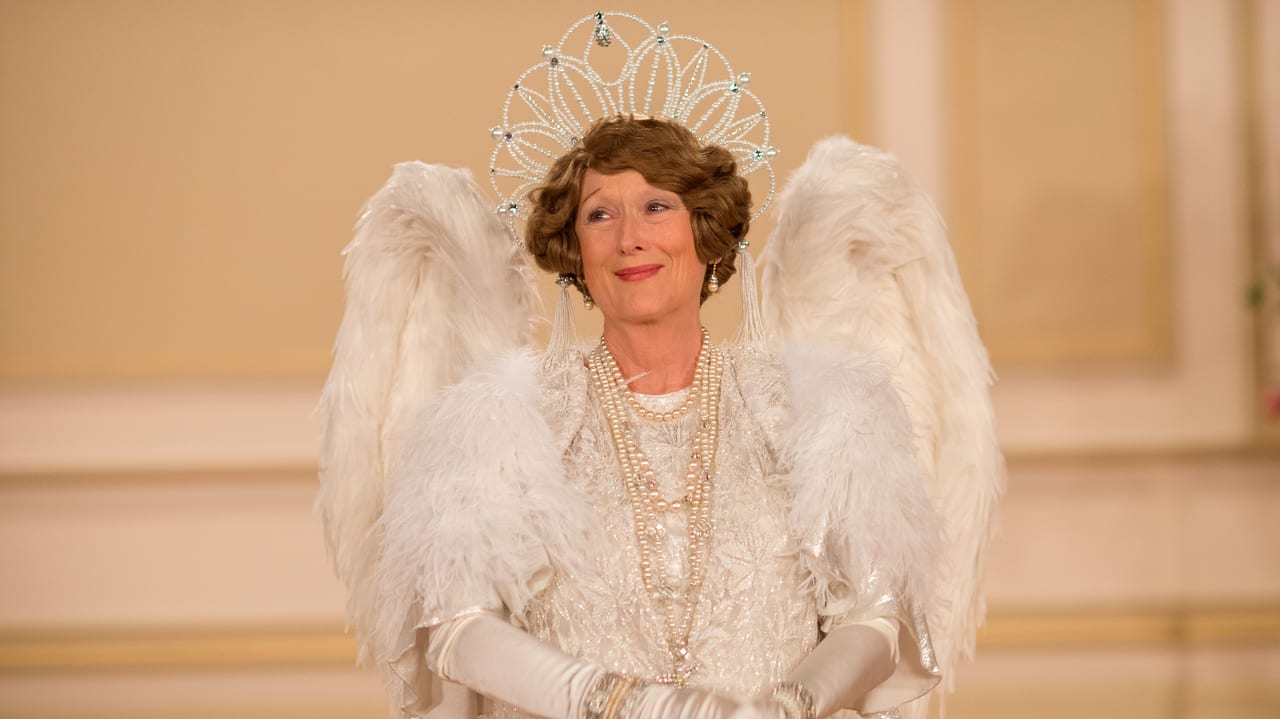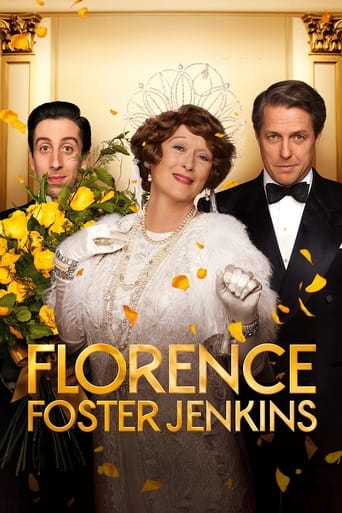



It is a performances centric movie
hyped garbage
Each character in this movie — down to the smallest one — is an individual rather than a type, prone to spontaneous changes of mood and sometimes amusing outbursts of pettiness or ill humor.
View MoreThe movie turns out to be a little better than the average. Starting from a romantic formula often seen in the cinema, it ends in the most predictable (and somewhat bland) way.
View MoreFlorence Foster JenkinsUnlike any other biography, it is to-the-point fast paced hilarious feature that demands attention of the viewers through its innovative structure of the script and an eerie perspective. Despite of being a musical, it fails to create the anticipated magic on screen, although it is rich and visually pleasing on costume design and make-up design. The writer being aware of its ironic and comic tone of the plot doesn't install any funny bits forcibly and instead lets it flow swiftly to the shore. Nicholas Martin; the writer, has done an amazing work on writing such a gripping and light screenplay which could have easily been darker and heavier than it seems. Stephen Frears; the director, as always is no short on execution or editing and conveys its message completely within 110 minutes of runtime. Possessing such a bigger cast, the makers manipulates the audience accordingly and uses their potential wisely where every actor is giving their best like Meryl Streep, Hugh Grant and even Simon Helberg; as a supporting cast. Surprisingly, it is a plot driven feature that gives adequate screen time to each and every character and gives them enough room and range for them to factor in. Florence Foster Jenkins is a sharp and genuine whisper that fuels on its subtle yet heart-breaking emotions that is mostly drawn out by its stellar performances.
View MoreBack in 2005, the Broadway play "Souvenir" documented the rehearsals for a concert at Carnagie Hall and the relationship between Ms. Jenkins and her piano player. Jenkins sang like a chicken being boiled alive but thought she sounded like an angel. For Tony winning actress Judy Kaye, she believed that her rendition of "Ave Maria" could induce tears, and after 90 minutes of laughing at the denial of the wealthy New York socialite, I was in tears. Somehow in that period of time, I began to love Florence rather than pity her, because indeed inside, she had heart, and truly sang with the passion of a Metropolitan Opera diva.Now it's Meryl Streep's turn, and the New York atmosphere of 1944 is superbly presented. At a time when dancing sailors took over the city in "On the Town", Barbara Stanwyck plotted to kill her husband, Tallulah Bankhead fished with diamonds in the middle of the Atlantic and Judy Garland sang on a trolley, Jenkins brought opera to society in a way it had never been heard. Hughes Grant plays her younger husband (possibly bigamous) who hides from her how awful she is. As a person, Jenkins is needy, affectionate, slightly snooty and becomes sort of a mother figure to her obviously gay piano player Simon Helberg who comes to appreciate her as he spends private time with her.In a sense, Jenkins became a folk hero of sorts, with music patrons deaf to her off key warbling and wounded soldiers influenced by her music. Grant and Helberg are both outstanding, and once again, Streep immerses herself in the part, sort of a singing Julia Child. This shows the real Jenkins at her best and worst, bald as a billiard ball and complaining about syphilis scars she got on the night of her first marriage. If untalented as untalented can be, she at least tried to go for her dreams, and if in denial of her talent at least had the soul to sing from. That in itself makes this movie worth while, coming in an era when dreams die faster than the latest fad and cynicism destroys the will to fully devote to one's goals.
View MoreIn my youth, the name Florence Foster Jenkins was always a source of laughter as belonging to the world's worse soprano who had an inability to sing on pitch. (A case in point was her infamous attempt at singing the famous Queen of the Night aria, ("Der Hölle Rache kocht in meinem Herzen") I have not seen the other recent film "Marguerite" (2015) which was very loosely based on her career but this film is closer to her real life. For example, it turns out she was suffering from syphilis caught from her husband Dr. Frank Jenkins early on. So she was perhaps not completely in her right mind afterward.But she made the best of her life as she saw it.Meryl Streep plays Florence with her usual skill in another Oscar-worthy performance, Hugh Grant plays her "sort-of-husband" and manager St. Clair Bayfield (they avoided any conjugal relations by mutual agreement and he had his own real marriage.) and is a fine match for Streep.However, the big surprise is Simon Helberg (Wolowitz on The Big Bang theory) who plays the sorely-tried accompanist to Madame Jenkins, Cosmé McMoon,"McMunn" originally, but that is not mentioned in this film.Although Helberg doesn't avoid McMoon's effeminate gestures, he doesn't overdo them either. (How about best-supporting actor?) Well-done all around!
View MoreI'll admit, I thought that the premise of "Florence Foster Jenkins" (wealthy, tone-deaf, opera-singer-wannabee) was pretty thin high-concept until I found out that it was based on an actual person. Meryl Streep (and the film in general) does a good job of walking the thin line between the obvious broad-comedy of Florence's awful singing with the somewhat sad story of a women with medical (and perhaps mental) issues, who just wanted to live out her dream (and had a lot of cash, which helps). There seems little doubt that Jenkins contributed greatly to the music scene in New York, supported the U.S. troops, and was generally liked. Less clear (at least to me) is whether she was completely delusional about her singing prowess or whether she was "in on the joke" to some extent. I have heard some of her original recordings and she is terrible (and I couldn't tell an A-list opera star from a talented amateur), so whether she simply heard what she wanted to hear (as suggested in the movie) is open to debate. Streep is very good, as is Hugh Grant (in a perfect role for his standard British fop delivery), but as her pianist Cosmé McMoon, Simon Helberg, perhaps playing it a bit too close to his Big Bang Theory "Howard" character, was overly 'hammy' for my tastes. In the end, Jenkins' recordings sold well, but I don't know whether people bought them simply as novelty items or whether there was greater merit in her singing than the movie implies. In the fine arts greatness can come with changing tastes (Van Gogh is a classic example), but I'm not sure if that applies to opera.
View More